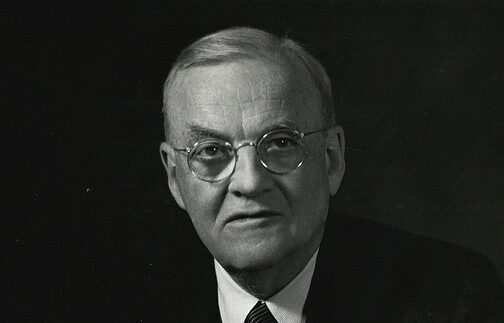
John Foster Dulles
Death
May 24, 1959
Recognition/Achievement
First Secretary of State to hold regular press conferences
Role/Rank
Secretary of State
Biography
Grandson of one Secretary of State and nephew of another, John Foster Dulles benefited from several unique opportunities which prepared him well to become a leader in government service. While still a college student at Princeton, he participated with his grandfather, John Watson Foster in the Second Hague Conference in 1907. Following graduation from Princeton and a year at the Sorbonne, Dulles entered the George Washington Law School, completing the degree requirements in only two years.
While his uncle Robert Lansing was Secretary of State, the young lawyer served as economic and legal counsel to the U.S. delegation to the Versailles Peace Conference at the end of World War I. This experience taught Dulles the need to have strong domestic support for U.S. foreign policy as President Wilson’s advocacy for U.S. participation in the League of Nations failure to gather public and therefore legislative support.
For the next two decades, Dulles moved in and out of his legal practice and government service. At the close of World War II, Dulles helped prepare the United Nations charter at Dumbarton Oaks, in Washington, D.C., and then served as a senior adviser at the United Nations founding conference in San Francisco in 1945.
In April 1951, President Truman sent Dulles to Tokyo to assure the Japanese Government that General MacArthur’s departure signified no important change in United States policy in the Far East. Truman then chose Dulles to be a special representative in the peace treaty negotiations with Japan. Dulles applied the lessons learned from harsh compensation demanded in Versailles to conclude a treaty“based on the theory that the best way to assure Japan’s adherence to peaceful ways was to conclude with her a non-restrictive and liberal peace treaty.”
On January 21, 1953, President Dwight D. Eisenhower appointed Dulles as his Secretary of State. During his term, Dulles and Eisenhower forged a strong friendship that granted the Secretary direct and unprecedented access to the President. Dulles’s time as Secretary was marked by a general consensus in U.S. policy that peace could be maintained through the containment of communism. He was the champion of using security treaties — NATO, SEATO, the Baghdad Pact, and the Eisenhower Doctrine — to keep the Soviet Union in check.
Dulles’s tenure was marked by many Cold War foreign policy challenges including the division and integration of Europe, the escalation of the crisis in Indochina, the Soviet military to the Hungarian Revolution, and the Suez Canal crisis of 1956. He was a proponent of the threat of “massive retaliation.” Dulles also enjoyed the close cooperation of the Central Intelligence Agency, which was run by his brother, Allen Dulles. He was the first Secretary of State to be directly accessible to the media and to hold the Department press conferences. Faced with terminal cancer, he resigned as Secretary of State a month before his death in May 1959.